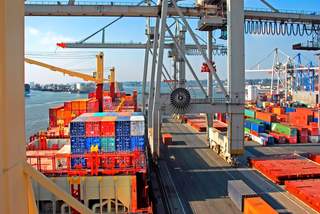
Container ship ©fotolia.de/Donvictori
The United States in the World Trade Organisation
Even before the founding of the WTO 25 years ago, the United States was one of the three largest trading nations worldwide. U.S. enterprises have benefitted profoundly from the rules-based trading system and market access provided by the multilateral organisation. No other WTO member has used the organisation’s dispute settlement mechanism nearly as often to resolve potential violations by other Members (124 cases in June 2021). There are, however, several aspects of the organisation that already significantly disturbed Washington before President Trump took office.
Dissatisfaction with the WTO
To date, despite years of negotiations, it has not been possible to reach the necessary consensus among the now 164 members to substantially open up the markets of the emerging economies, in particular. The U.S. government lost more and more faith that international competition - especially with China - can be made fair with the help of the WTO. In fact, the EU also shares the view that, for example, notification obligations on trade measures cannot be sufficiently enforced and that existing multilateral rules on subsidies or the protection of intellectual property and state-owned enterprises do not go far enough.
The United States is also particularly dissatisfied with the WTO's dispute settlement system. This is not only because the U.S. regularly loses in disputes in which other countries take action against the U.S.'s anti-dumping practices. In addition, Washington criticises excessively long proceedings and an alleged transgression of jurisdiction by the Appellate Body (AB). On the whole, the United States as a global power has a hard time accepting international, independent, and binding arbitration awards and internationally-agreed treaties.
The Crisis of Multilateralism and Outlook
While the situation of the WTO was already difficult due to the failure of the Doha Development Agenda Round and disagreement on how to proceed, the U.S. stance has now plunged the WTO into a fundamental crisis. Not only has the United States imposed special tariffs in the last two years (on aluminium and steel imports, numerous imports from China, etc.), which affected states consider to be in violation of WTO law. Washington is also blocking the appointment of judges to the AB, so that this decisive body has not been able to decide on any new cases since mid-December 2019.
In fall 2020, the United States also prevented the appointment of a new WTO Director General. While the majority of WTO members had agreed on the Nigerian candidate, the United States demanded that the South Korean candidate, considered to be more friendly to U.S. interests, should be appointed. Eventually, they turned around and supported eventual Director-General Dr. Ngozi Okonjo-Iweala, but it remains to be seen to what extent they will support her agenda.
Under the Trump administration, the United States did not sufficiently respond to reform proposals from other WTO members intended to address U.S. criticism of the dispute settlement system and unblock the AB. In other areas, however, the Trump administration was working more constructively on reforming the WTO. This applies, for example, to a reform of transparency rules, negotiation of new rules for electronic commerce, and also the Trilateral Initiative proposal to reform the Agreement on Subsidies and Countervailing Measures.
Biden is clearly more open to multilateral organisations and negotiated solutions and plans to rejoin the Paris Climate Agreement. He sees a great need for reform of the WTO but acknowledges its usefulness as an “effective tool” with U.S. engagement. Moreover, Biden stresses the importance of the Western community of values and offers therein hope that transatlantic cooperation could be intensified – including in WTO reform. It is high time for the United States to return to the WTO negotiating table. Washington should also keep in mind that key WTO members will only agree to reforms if the United States, for its part, demonstrates respect for international rules and no longer blocks the dispute settlement function.



